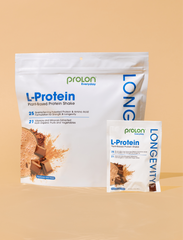
Spring Into Energy: Building Better Metabolic Health One Step At A Time
When we think about metabolism, we often think about burning calories– but this incredible system of biological processes is so much more than that! A healthy metabolism also encompasses energy production, hormonal balance, and cellular efficiency, all of which our bodies need in order to function optimally. And spring, a season of renewal, is the perfect time to think about resetting and revitalizing your metabolic health.
Here are some small but useful ways you can support your metabolic health this spring - and improve energy levels and vitality for the rest of the year too:
Sync Your Habits To Circadian Rhythms
Circadian rhythms are like the body’s internal clock; they’re the natural changes that occur over a 24-hour cycle, and affect everything from sleep patterns, hormone production, and body temperature to appetite and digestion. When we align our daily habits to circadian rhythms, we can enhance our energy levels and improve metabolic function for all of these key processes.
Try these actionable strategies for syncing your lifestyle to circadian rhythms:
-
Prioritize Morning Light Exposure: Instead of checking your devices first thing in the morning, start your day with natural sunlight which helps regulate cortisol and melatonin.
-
Follow a Time Restricted Eating (TRE) Pattern: Eating within a 12 hour window between sunrise to sundown aligns with your body's circadian rhythms for metabolic efficiency and can help reduce insulin resistance. This includes eating breakfast and limiting any late-night snacking.
- Fine-tune Your Sleep Routine: Wind down at the end of each day with low light, minimal screen exposure, and a consistent bedtime. These habits can support cellular repair and fat metabolism with optimal glucose regulation.
Eat Seasonal, Metabolism-Supporting Foods
Eating fruits and vegetables when they’re in season provides your body with the nutrients it needs most for that time of year. Springtime foods, for example, tend to be high in antioxidants, fiber, and prebiotics which not only serve to boost immunity and energy levels after slower winter months, but also support better gut health and metabolic balance.
Here are some seasonal, metabolic health-supporting foods to look out for this spring:
- Leafy Greens: Spring greens like spinach, arugula, and baby kale are nutrient-dense vegetables that provide a rich source of fiber and antioxidants, both of which support gut health.
- Berries: Fresh berries like strawberries, blueberries, and raspberries are rich in polyphenols which can enhance mitochondrial function to help improve energy.
- Asparagus & Artichokes: Rich in prebiotic fiber, which supports metabolic health by nourishing your gut microbiota—helping regulate blood sugar, reduce inflammation, and optimize nutrient absorption.
- Citrus Fruits: Lemons, oranges, and grapefruit provide high doses of vitamin C for immunity, in addition to bioflavonoids which help regulate blood sugar and support adrenal function.
- Fermented Foods: Kimchi, sauerkraut, and kefir contain diverse microbiomes which help enhance gut diversity and improve metabolic efficiency.
In addition to swapping out processed snacks for whole, nutrient-dense, and seasonal options, try hydrating with lemon water or herbal teas to promote better digestion and help detox your metabolic pathways.
Exercise For Metabolic Optimization
Regular movement is key for supporting insulin sensitivity, adequate muscle mass, and mitochondrial health. Look for exercise options that you also enjoy and that make you feel good. For busy schedules, you can even incorporate micro-movements throughout the day like stretch breaks, walking meetings, or opting for a standing desk. Since different types of movement offer their own unique metabolic benefits, here are some of the ways you can move smarter to improve your metabolic health:
- Daily Nature Walks combine prolonged movement with sunlight exposure, and can also help to reduce stress levels.
- Strength Training at least 2 to 3 times per week helps build lean muscle, which can enhance your resting metabolic rate and improve glucose uptake.
- Stretching and Mobility Work encourages lymphatic drainage and cellular repair.
- Post-Meal Movement like a 10-15 minute walk after meals can improve glucose metabolism for better digestion and blood sugar regulation.
Do A Cellular Spring Cleaning
Spring cleaning isn’t just for your home—it’s for your cells, too. Prolonged fasting has been shown to support metabolic health in part by activating the body’s natural cleansing process called autophagy, which removes and recycles damaged cells to make room for healthier ones.
-
Prolon’s 5-Day Fasting Mimicking Diet (FMD) is designed to activate this powerful cellular renewal while still nourishing your body, helping you rejuvenate from the inside out, and has been shown to support healthy metabolic markers.
- For a quicker refresh, 1-Day Reset gives your body a break while also kicking it into ketosis. It’s a great way to rebalance for spring, jumpstart a new wellness routine, or begin a 5:2 intermittent fasting routine for the season ahead.
Reduce Chronic Stress And Prioritize Good Sleep
Chronic stress is the kind that lingers over longer periods of time and can wreak havoc on several metabolic processes. It often leads to things like increased cortisol levels, insulin resistance, sluggishness, and chronic inflammation, among others. Similarly, sleep is the foundation of metabolic repair, so when we don’t get enough of it, our glucose regulation, appetite regulating hormones, and fat metabolism are all negatively affected.
Since reducing chronic stressors and getting regular, quality sleep are vital for so many important metabolic processes, let’s look at some of the ways you can improve yours:
- Breathwork and meditation can help lower cortisol levels, and enhance parasympathetic activity which is responsible for counteracting your “fight-or-flight” stress response.
- Spending time in nature not only tends to improve your mood but also helps to reduce stress
- Journaling and practicing gratitude can help shift focus from chronic stressors to more positive reinforcements.
- Aim for 7 to 9 hours of sleep a night to ensure you get the kind of consistent, high-quality sleep that’s essential for optimal metabolic health. It’s ideal to finish eating your last meal 2-3 hours before going to sleep.
- Reduce blue light exposure at bedtime to help promote melatonin production which contributes to better rest.
- Maintain an effective sleep environment that includes a cool, dark, and quiet space for better quality sleep, and metabolic recovery.
For greater metabolic support, L-Nutra Health, our medical division, offers comprehensive and non-invasive programs shown to lower blood sugar levels, improve insulin sensitivity, and target fat-focused weight loss while protecting muscle mass. Programs integrate multiple cycles of a low-glycemic 5-day FMD along with lab monitoring, personalized nutrition guidance from registered dietitians, stress management strategies, exercise protocols, and physician oversight to help patients achieve lasting results.
Let spring’s spirit of renewal inspire you to take action, and support your metabolic health this year. Your wellbeing will thank you for it!
- Cleveland Clinic. “Parasympathetic Nervous System (PSNS).” Webpage.
- National Library of Medicine. National Center for Biotechnology Information. “Beneficial Effects of Citrus Flavonoids on Cardiovascular and Metabolic Health.” Webpage.
- National Library of Medicine. National Center for Biotechnology Information. “Dietary Polyphenols and Mitochondrial Function: Role in Health and Disease.” Webpage.
- National Library of Medicine. National Center for Biotechnology Information. “Efficacy of glutathione for the treatment of nonalcoholic fatty liver disease: an open-label, single-arm, multicenter, pilot study.” Webpage.
- National Library of Medicine. National Center for Biotechnology Information. “Exercise and metabolic health: beyond skeletal muscle.” Webpage.
- National Library of Medicine. National Center for Biotechnology Information. “Fermented Foods, Health and the Gut Microbiome.” Webpage.
- National Library of Medicine. National Center for Biotechnology Information. “Role of Skeletal Muscle in Insulin Resistance and Glucose Uptake.” Webpage.
- NIH. National Institute of General Medical Sciences. “Circadian Rhythms.” Webpage.













